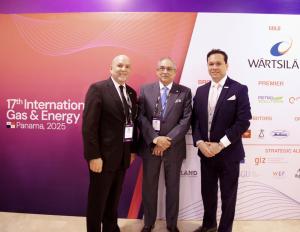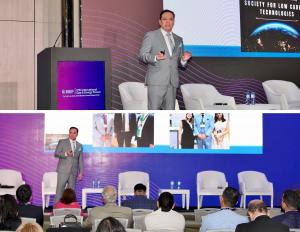From Panama to Pakistan: The International Forum Forging Low-Carbon Diplomacy
PANAMA, PANAMA, May 22, 2025 /EINPresswire.com/ -- The 17th edition of the International Gas & Energy Forum (IGEF) marked a defining evolution in scope with its first-ever Carbon Capture, Utilization, and Storage (CCUS) edition—headlined by a keynote from the Society for Low Carbon Technologies (SFLCT). This milestone reflected a doctrinal inflection point for a forum renowned for its legacy and technical rigor, coinciding with renewed global focus on Panama and the strategic relevance of its canal. The forum brought together multi-sector energy leaders and global institutions, including Panama’s Secretary of Energy, Juan Manuel Urriola, who officiated the event.
As a certified supporting organization of IGEF, SFLCT shaped the CCUS edition’s direction through the leadership of its Chairman, Fernando C. Hernandez, who delivered the keynote address. During his address, Hernandez went beyond forecasts to show that the SFLCT is unifying continents by showcasing its impact with the governments of Scotland, Pakistan, and Brazil—via net-zero diplomacy, clean tech deployment, and the passage of South America’s first carbon capture law, respectively. This legislative milestone included U.S. Department of Energy engagement. These concrete examples redefined the Global South and Global North divide that can exist in the energy transition. Hernandez commented, “As a representative of a global organization, this forum gave voice to my brothers and sisters in Africa and Asia—too often absent from the rooms shaping global energy outcomes.”
The result: a vision beyond geopolitical boundaries, offering a case study in how Global South cooperation is evolving with structure and intent in defense of the biosphere shared by all. Following his address, he moderated a panel titled “CCUS and Low-Carbon Technologies in a Transitioning Market,” featuring Topsoe, BGP Latin America, and Brazil’s Federal University of Rio de Janeiro.
Following the forum, attention turned to the Panama Canal—which Hernandez visited while tariff ripples permeated the global economy—recognizing its role as a strategic and macroeconomic corridor and an evolving backbone of the low-carbon transition. Hernandez highlighted the NetZero Slot initiative launched by the Panama Canal Authority, which prioritizes lower-emission vessels and integrates sustainability into a key maritime artery. The canal offers a model for aligning infrastructure with decarbonization goals—via energy transition fuels such as Liquefied Natural Gas (LNG), which—alongside similar fuels—are reshaping maritime flows.
In January, prior to the forum, in a videocast recorded while in Pakistan, Hernandez emphasized the importance of Liquefied Petroleum Gas (LPG) for the Global South and its low-carbon impact—an insight that gains renewed relevance as Panama explores a proposed LPG pipeline to accelerate cross-isthmus transport. This initiative, currently under evaluation by the Panama Canal Authority, aims to enhance global LPG trade by elevating Panama’s position as a liquefied energy corridor—a vision aligned with discussions held at IGEF.
Further underscoring this alignment, the CEO of IGEF, Miguel Zabala-Bishop, joined the SFLCT as an advisory member in the weeks following the conference—reinforcing the credibility and continuity of the forum’s outcomes. This critical event served as both a convening platform and a launchpad for a more connected, cross-regional approach to technology, policy, and low-carbon diplomacy. It affirmed that the next chapter in decarbonization will not be defined by one nation or sector but by coordinated frameworks and institutions that span hemispheres and champion intergenerational equity.
Press Relations
Society for Low Carbon Technologies
email us here
Visit us on social media:
LinkedIn
Legal Disclaimer:
EIN Presswire provides this news content "as is" without warranty of any kind. We do not accept any responsibility or liability for the accuracy, content, images, videos, licenses, completeness, legality, or reliability of the information contained in this article. If you have any complaints or copyright issues related to this article, kindly contact the author above.
Intracranial Aneurysm Market to Hit $2.7 Billion by 2031, Driven by Rising Demand for Minimally Invasive Solutions
Dolt, Thompson, Shepherd, Conway & Stanton, PSC Welcomes Accomplished Attorney Seth Gladstein as Partner
Swasher Pro Successfully Launches on Kickstarter
Więcej ważnych informacji
 Jedynka Newserii
Jedynka Newserii

 Jedynka Newserii
Jedynka Newserii

Ochrona środowiska

A. Bryłka (Konfederacja): Ograniczenie emisyjności nie musi się odbywać za pomocą celów klimatycznych. Są absurdalne, nierealne i niszczące europejską gospodarkę
W lipcu br. Komisja Europejska ogłosiła propozycję nowego celu klimatycznego, który zakłada ograniczenie emisji gazów cieplarnianych o 90 proc. do 2040 roku w porównaniu do stanu z 1990 roku. Został on zaproponowany bez zgody państw członkowskich, w przeciwieństwie do poprzednich celów na 2030 i 2050 rok. Polscy europarlamentarzyści uważają ochronę środowiska i zmiany w jej zakresie za potrzebne, jednak nie powinny się odbywać za pomocą nieosiągalnych celów klimatycznych.
Polityka
Dramatyczna sytuacja ludności w Strefie Gazy. Pilnie potrzebna dobrze zorganizowana pomoc humanitarna

Według danych organizacji Nutrition Cluster w Strefie Gazy w lipcu br. u prawie 12 tys. dzieci poniżej piątego roku życia stwierdzono ostre niedożywienie. To najwyższa miesięczna liczba odnotowana do tej pory. Mimo zniesienia całkowitej blokady Strefy Gazy sytuacja w dalszym ciągu jest dramatyczna, a z każdym dniem się pogarsza. Przedstawiciele Polskiej Akcji Humanitarnej uważają, że potrzebna jest natychmiastowa pomoc, która musi być dostosowana do aktualnych potrzeb poszkodowanych i wsparta przez stronę izraelską.
Polityka
Wśród Polaków rośnie zainteresowanie produktami emerytalnymi. Coraz chętniej wpłacają oszczędności na konta IKE i IKZE

Wzrosła liczba osób, które oszczędzają na cele emerytalne, jak również wartość zgromadzonych środków. Liczba uczestników systemu emerytalnego wyniosła w 2024 roku ponad 20,8 mln osób, a wartość aktywów – 307,5 mld zł – wynika z najnowszych danych Urzędu Komisji Nadzoru Finansowego (UKNF). Wyraźny wzrost odnotowano w przypadku rachunków IKE i IKZE, na których korzyść działają m.in. zachęty podatkowe. Wpłacane na nie oszczędności są inwestowane, a tym samym wspierają gospodarkę i mogą przynosić atrakcyjną stopę zwrotu.
Partner serwisu
Szkolenia

Akademia Newserii
Akademia Newserii to projekt, w ramach którego najlepsi polscy dziennikarze biznesowi, giełdowi oraz lifestylowi, a także szkoleniowcy z wieloletnim doświadczeniem dzielą się swoją wiedzą nt. pracy z mediami.








.gif)

 |
| |
| |
|